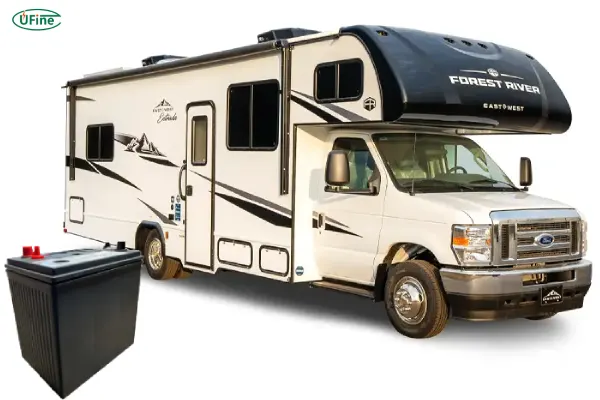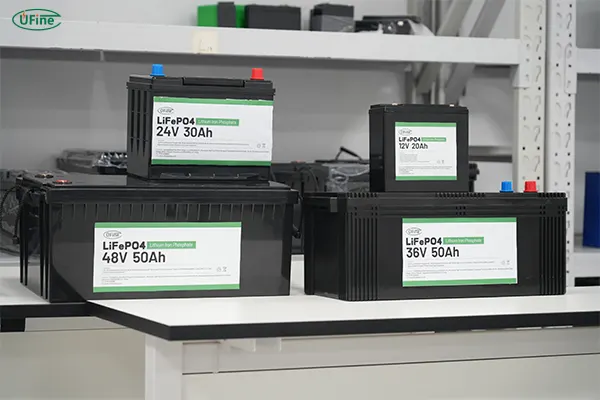As RV owners, ensuring your vehicle runs smoothly and reliably is a priority. Recent studies indicate that 60% of RV owners experience issues with their batteries during long trips, often due to using incorrect or outdated battery types. Imagine you’re halfway through a scenic drive, and your RV’s battery dies. It’s a nightmare scenario many RVers can relate to. In this article, we’ll explore the advantages and disadvantages of using an RV 6-volt battery, the ideal applications, and how to choose the right one for your needs. By the end, you’ll be better equipped to make an informed decision on whether a 6-volt battery is the right choice for your RV.
Part 1. Main dimensions of RV 6 volt batteries
When considering the best battery for your RV, understanding the main dimensions and specifications is essential. RV 6-volt batteries are designed to provide reliable energy over extended periods, particularly for deep-cycle applications. The main physical dimensions of a 6-volt battery typically include height, length, and width, which can affect compatibility with different RV models. For instance, a typical 6-volt deep cycle battery is 10.3 inches in length, 7.1 inches in width, and 9.1 inches in height.
Key Dimensions You Should Know:
- Voltage: 6 Volts (perfect for deep-cycle use)
- Capacity: Typically ranges from 200 to 230 amp-hours
- Weight: 60-70 pounds (important for weight-sensitive RVs)
Would a 6-volt battery fit your RV? Checking the dimensions and ensuring it fits the battery compartment is the first step in determining whether this battery will be a good match.
Part 2. Key parameters when buying an RV 6 volt battery
Before purchasing an RV 6-volt battery, it’s crucial to assess several key parameters to ensure the battery’s performance aligns with your needs. Here are the seven most critical factors:
- Capacity (Ah): The amp-hour rating tells you how much power the battery can store and how long it can run your RV’s electrical systems.
- Cycle Life: This is the number of charge-discharge cycles the battery can go through before its capacity drops. A higher cycle life means longer-lasting performance.
- Weight: Depending on the type of RV you have, weight can be a significant factor in battery selection.
- Brand Reliability: Trusted brands like Ufine Battery, a leading Chinese manufacturer, ensure quality and reliable performance.
- Voltage Consistency: Look for batteries with a stable voltage output, as fluctuations can harm your RV’s systems.
- Temperature Tolerance: RVs travel through varying climates. A battery that can handle both high and low temperatures will save you from unnecessary replacements.
- Warranty: A longer warranty period is a sign of durability, and a reliable warranty gives you peace of mind.
Part 3. The Pros and Cons
When considering an RV 6-volt battery, it’s essential to weigh the advantages and disadvantages. These batteries are popular for their efficiency and reliability, but they may not be the best fit for every RV.
Advantages:
- Longer Lifespan: RV 6-volt batteries generally last longer than their 12-volt counterparts due to their design, making them ideal for deep-cycle use.
- Better Performance in Series: When connected in series, two 6-volt batteries can provide 12 volts, delivering more power than a single 12-volt battery.
- Cost-Effective: They tend to be more affordable upfront, especially for larger power systems.
Disadvantages:
- Requires Dual Setup: To achieve 12 volts, two 6-volt batteries must be connected in series, which can take up more space and increase the installation complexity.
- Heavier: Due to their design, 6-volt batteries are often heavier, which could be a factor in space-limited RVs.
So, should you buy a 6-volt battery for your RV? The answer depends on your specific power needs and the size of your RV.
Part 4. What kind of RV is the 6 volt battery more suitable for?
RV 6-volt batteries are perfect for larger, more power-hungry RVs that require significant deep-cycle use. For example, if you frequently use your RV for extended periods or have high-power needs like running a refrigerator, lights, and other appliances simultaneously, a 6-volt battery system is ideal.
Which RVs Should Consider 6-Volt Batteries?
- Class A RVs: These motorhomes are typically larger and use more electricity.
- Fifth-Wheel Trailers: These trailers often have more appliances and require larger energy storage.
- Bus Conversions: If you’ve converted a bus into an RV, the higher power capacity provided by 6-volt batteries may be necessary.
For smaller RVs or campers, 12-volt batteries might suffice, but if your RV falls into the above categories, a 6-volt battery system will likely serve you better.
Part 5. Can my RV use 6V batteries? How to check?
Before switching to an RV 6-volt battery, it’s important to determine if your RV is compatible. Most RVs can accommodate 6-volt batteries if you plan to wire them in series to create a 12-volt system.
Here’s how you can check compatibility:
- Measure the Battery Compartment: Ensure there is enough space to fit two 6-volt batteries in series.
- Review the RV’s Electrical System: If your RV uses a 12-volt system, you can connect two 6-volt batteries in series to get 12 volts.
- Consult the Manufacturer’s Guide: Always refer to the owner’s manual or consult with a professional to confirm compatibility.
Can 6-Volt Batteries Work in Your RV?
If your RV was designed to support deep-cycle batteries, it can likely use a 6-volt system. However, consulting a professional is always a good idea to avoid installation issues.
Part 6. What is a 6 volt deep cycle RV battery?
A 6-volt deep cycle battery is specifically designed to discharge and recharge multiple times, which makes it ideal for RV use. Unlike a starting battery that provides a quick burst of energy, a deep-cycle battery is designed to provide a steady amount of energy over a longer period.
Key Features of a Deep-Cycle 6-Volt Battery:
- Longer Discharge Time: They are designed to last longer between charges, which is ideal for RVs that need power for extended periods.
- Better Charge Retention: These batteries are more efficient in holding their charge over time compared to other types of batteries.
If you’re planning on using your RV for off-grid camping or long trips, a 6-volt deep-cycle battery will provide the reliability you need.
Part 7. How to choose the best RV 6 volt battery?
Choosing the best RV 6-volt battery involves considering your RV’s energy requirements, battery specifications, and budget. Here are some tips for selecting the right one:
- Assess Your Power Needs: Calculate the total wattage of the appliances you plan to run to determine the battery capacity required.
- Choose a High-Quality Brand: Opt for a reputable brand like Ufine Battery, which specializes in custom lithium-ion and deep-cycle batteries, ensuring long-lasting performance and efficiency.
- Check for Warranty and Support: A solid warranty can save you from future costs.
Need Help Choosing?
For expert advice on selecting the best RV battery, contact Ufine Battery today, and we can help tailor a solution that fits your RV’s needs.
Part 8. What charger should you use for RV 6 volt battery?
Using the correct charger for your RV 6-volt battery is crucial for ensuring its longevity. Typically, a 12-volt RV battery charger is required to charge two 6-volt batteries connected in series.
Charger Recommendations:
- Multi-stage Charger: This type of charger prevents overcharging and extends the life of your battery.
- Equalization Mode: If using flooded lead-acid 6-volt batteries, look for a charger with an equalization mode to balance the charge between batteries.
If you’re unsure about which charger to buy, Ufine Battery also offers guidance on the best charging solutions for your RV 6-volt battery.
Part 9. Where to buy RV 6 volt batteries?
You can buy RV 6-volt batteries from numerous suppliers, but it’s always best to purchase from a trusted provider who offers warranty and post-sale support. Ufine Battery is an established manufacturer specializing in high-quality lithium and deep-cycle batteries.
Where to Buy?
- Online Stores: Websites like Amazon and specialized RV retailers carry a wide selection of RV 6-volt batteries.
- Local Dealers: Check with local RV stores for expert recommendations and hands-on support.
Related Tags:
More Articles

Stick Up Cam Battery Life: What to Expect and How to Improve It
How long does Stick Up Cam battery last? Learn about battery types, charge time, tips to extend battery life, and how to replace it—simple and easy to follow.
Best Security Camera Batteries: Complete Buying Guide
Find the best security camera battery for your needs. Learn about types, lifespan, charging tips, and how to avoid common battery problems.
ICR18650 Battery Explained: Chemistry, Use Cases, and Limitations
The ICR18650 battery is widely used in electronics. Learn its chemistry, uses, pros, and cons to see if it's right for your device or project.
A Detailed Exploration of Wireless Keyboard Battery
Learn how to choose, maintain, and troubleshoot wireless keyboard batteries. Discover why lithium batteries are the best choice for long-lasting performance.
Best Rechargeable Batteries for Solar Lights: Lithium vs NiMH vs NiCd Compared
Compare lithium-ion, NiMH, and NiCd batteries to find the best rechargeable option for solar lights based on performance, cost, and lifespan.





